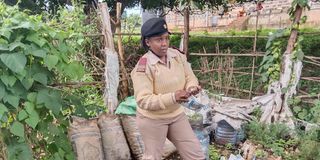Meet administrator making planet a greener place one milk packet at a time

Kapenguria Division assistant County Commissioner Ruth Wachera preparing empty milk packets to use for raising tree seedlings at her tree nursery in Kapenguria on July 12, 2024.
What you need to know:
- So far, she has successfully planted 30,000 seedlings using the Jaza Miti App to tackle climate change.
- The app is designed to provide assistance to users in selecting suitable tree species for planting based on their location.
After attending to her morning duties at her Kapenguria office, Ruth Wachera puts on her gumboots and heads to her tree nursery behind the office.
The tree nursery is flourishing with different species of tree seedlings.

Tree seedlings in empty milk packets at Kapenguria Division tree nursery.
The Kapenguria Division assistant county commissioner in West Pokot County is joined by her intern workers as she embarks on preparing empty milk packets placed in sacks.
She digs up soil using a panga and mixes it with sand and ash, saying the process is crucial for providing the tree seedlings with excellent nutrients.
The administrator fills the milk packets with the mixture of soil, sand and ashes and then plants the seedlings.
“You cannot tell people to plant trees without leading by example,” she says.
Ms Wachera has been planting tree seedlings and distributing them to locals for free in the past one year.
She tells Climate Action that so far she has successfully planted 30,000 seedlings using the Jaza Miti App to tackle climate change.
The Jazamiti App is designed to provide assistance to users in selecting suitable tree species for planting based on their location. It also allows users to document, track and monitor the growth of documented trees over time.
Ms Wachera says she started the initiative in December 2022 to tackle climate change in semi-arid areas, adding that it’s in line with the presidential directive of planting 15 billion trees by 2032.
She notes that empty milk packets can be easily obtained from markets, homes and institutions.
“We should not waste ash and used milk packets,” she says, adding that she uses the packets because they are easily available, ecologically friendly and capable of retaining water even during the dry season.
After establishing a bed for tree seedlings, she mentions the importance of watering the seedlings so they can grow. “Once they have grown, you can transfer them into the milk packets,” she says.
Ms Wachera plants both indigenous and exotic tree seedlings.
She explains that ash contains high levels of potassium, sodium and magnesium, which are essential for the formation of tree seedlings.
She says that as an assistant county commissioner responsible for implementing presidential directives through chiefs and assistant chiefs, she contemplated how she could set precedent by establishing a tree nursery.
She points out that she balances her work as an administrator and environmentalist from Monday to Friday.
“I collect milk pouches wherever I spot them without shame. I also gather ripe fruits and extract seeds, dry and plant them,” she says.
Ms Wachera says she believes that by planting more trees, Kenyans can safeguard the ecological balance and ensure a sustainable future.
She encourages individuals as well as public institutions such as primary and secondary schools and government offices to consider establishing tree nurseries within their enclosed environments.
“Starting and running a tree nursery is not a hard task,” she says.
The administrator expresses her preference for planting trees in public schools and institutions, highlighting that learners actively contribute by digging holes, planting the trees and watering them.
As a voluntary initiative, Ms Wachera says the involvement of learners in tree planting exercises enables them to become key participants in addressing climate change.
She stresses the importance of trees in preventing soil erosion, supplying clean water, fresh air, shade and nourishment of people, animals and vegetation.
“Trees enhance the aesthetic appeal of our surroundings, providing natural beauty and shade, and serving as habitats for wildlife.”
Ms Wachera adds that trees absorb carbon dioxide through photosynthesis and store the carbon in their trunks, branches, and roots. “As trees grow, they continue to sequester carbon, making them an effective tool for reducing greenhouse gas emissions, the main cause of global warming.
“Therefore, planting more trees can help reduce the amount of carbon dioxide in the atmosphere and mitigate the effects of climate change,’’ she says.
In the Kapenguria Division tree nursery, they are cultivating a variety of exotic and indigenous seedlings. These include approximately 800 Korrelach (Croton) seedlings, 400 seedlings of the Syzygium Guineense tree, 3500 Cyprus seedlings, and around 2,000 seedlings that have not yet been transplanted into empty milk packets. Additionally, there are a few pawpaw, white sapote and avocado tree seedlings.
The administrator says she nurtures the tree seedlings with the help of workers attached to her office.
“When they spot used milk packets, they inform me. We collect them together and put them in sacks. Assistant chiefs bring me wild trees and sometimes prisoners help me do the job,” she says.
The assistant county commissioner extends a warm invitation to individuals and institutions interested in planting trees within her jurisdiction to contact her for a donation of tree seedlings.
Ms Wachera, who studied Environment Conservation and Management in university, says she is planning to embark on planting fruit seedlings for food security.
Brian Kibet, a youth from the region, says they have embraced the initiative.
He appeals to locals to plant and grow trees in their land, homes, churches, and schools to reduce the effects of global warming, citing water shortage in the region.





